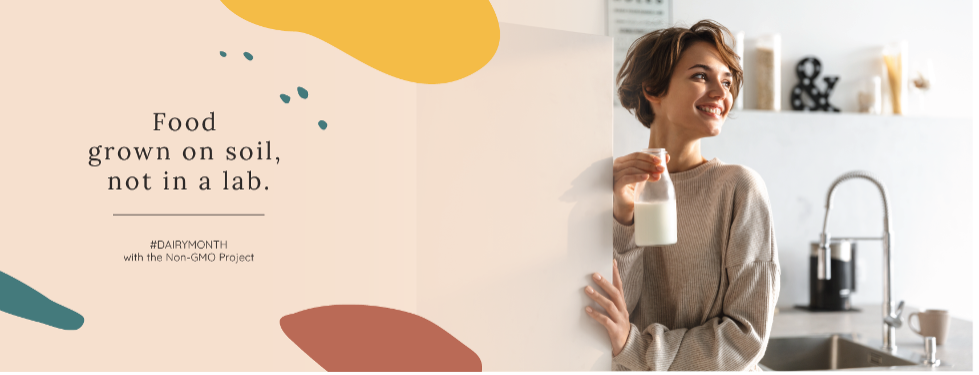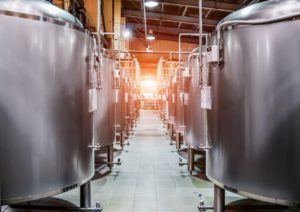 June is National Dairy Month! We're celebrating natural dairy by investigating an interloper in the dairy aisle, a wolf in cow's clothing: synthetic biology dairy proteins. Synbio proteins have fed the biotech's growing dairy presence in recent years, spawning a range of products made with non-animal dairy proteins.
June is National Dairy Month! We're celebrating natural dairy by investigating an interloper in the dairy aisle, a wolf in cow's clothing: synthetic biology dairy proteins. Synbio proteins have fed the biotech's growing dairy presence in recent years, spawning a range of products made with non-animal dairy proteins.
So far, these products include GMO milk, cheese spread and ice cream. It's important to note they aren't the same as plant-based dairy alternatives like oat milk or coconut milk ice cream. Plant-based products can be made naturally, and many are Non-GMO Project Verified options.
Non-animal dairy proteins, on the other hand, are another (non) animal altogether.
What is synbio dairy, precisely?
Non-animal dairy proteins are made through synthetic biology ("synbio"). Synbio techniques generally use genetically engineered microorganisms to produce novel compounds (in this case, dairy proteins) through fermentation.
 Picture this: Massive steel fermentation tanks housed in warehouses are populated with genetically engineered microorganisms such as yeast. The GMO microorganisms are fed a steady diet of simple sugars, which are broken down through fermentation. Genetic engineering instructs those microorganisms to produce dairy proteins. Then, the dairy proteins are separated from the growth medium, and combined with flavorings, texturizers, colorants, etc. to create synthetic milk products.
Picture this: Massive steel fermentation tanks housed in warehouses are populated with genetically engineered microorganisms such as yeast. The GMO microorganisms are fed a steady diet of simple sugars, which are broken down through fermentation. Genetic engineering instructs those microorganisms to produce dairy proteins. Then, the dairy proteins are separated from the growth medium, and combined with flavorings, texturizers, colorants, etc. to create synthetic milk products.
The synbio process is antithetical to a non-GMO or regenerative dairy operation. On a real dairy farm, the livestock is cows, not herds of microorganisms. The cows eat grass, non-GMO feed or a combination of the two, while microorganisms are fed simple sugars. Cows produce whole milk, and the byproduct is cow manure, which is a natural fertilizer. Microorganisms produce dairy proteins through a combination of genetic engineering and fermentation. The byproducts include significant biohazardous waste. Milk and cream are whole foods, whereas the ingredient panel on non-animal milk comprises more than a dozen other ingredients.
Synthetic biology isn't just for dairy proteins. It can be used to generate a wide range of compounds, including flavors, scents, vitamins or other additives. Currently, synbio ingredients show up in virtually every aisle in the grocery store. The companies behind these products use the marketing term "precision fermentation" to describe synthetic biology to their customers, but the products it describes are precisely unnatural.
Venture capital and future outlook
In the last five years, the Non-GMO Project's biotechnology research team has tracked a sharp increase in biotech developers exploring synthetic biology. That proliferation reflects the staggering private investment and the exponential growth of unnatural synbio ingredients.
In the words of SynBioBeta founder John Cumbers, "Once synthetic biology can direct cells to change identity, the possibilities could be only limited by our imagination." As the technology evolves to include new methods and products, synbio's presence in the supply chain grows.
"Just about all of this new food technology is heavily funded by tech oligarchs, venture capitalists, or the occasional celebrity," writes author and industry expert Errol Schweizer. (Schweizer serves on the Non-GMO Project's Board of Directors and is a panelist in the upcoming seminar, How Do You Milk a Microbe? How Synbio is Disrupting the Dairy Industry). Investors are focused on monopolizing emerging markets. "Think: Uber, Doordash, Instacart, Amazon. The investors throwing billions of dollars at such enterprises are not altruists, even if some are motivated by animal rights or climate change."
You are what you eat
Synbio dairy isn't the first GMO to impact the dairy industry.
Traditional GMOs, such as genetically engineered corn, soy, cotton and alfalfa, are common ingredients in conventional livestock feed, and their production dominates North American agricultural land. Other ingredients that appear in synbio dairy product formulations — such as sweeteners and starches — are assumed to be sourced from GMOs. Non-GMO Project verification ensures that your favorite dairy products meet the highest standard for GMO avoidance.
While livestock farming can involve various practices and outcomes, we believe the future is non-GMO and regenerative. We continue to work toward reducing the dairy industry's environmental impact, moving towards carbon sequestration, healthy people, animals and soil. Join us next week when we explore the regenerative potential of dairy operations and compare synbio's environmental footprint.
Until then, look for the Butterfly in the dairy aisle and beyond!
